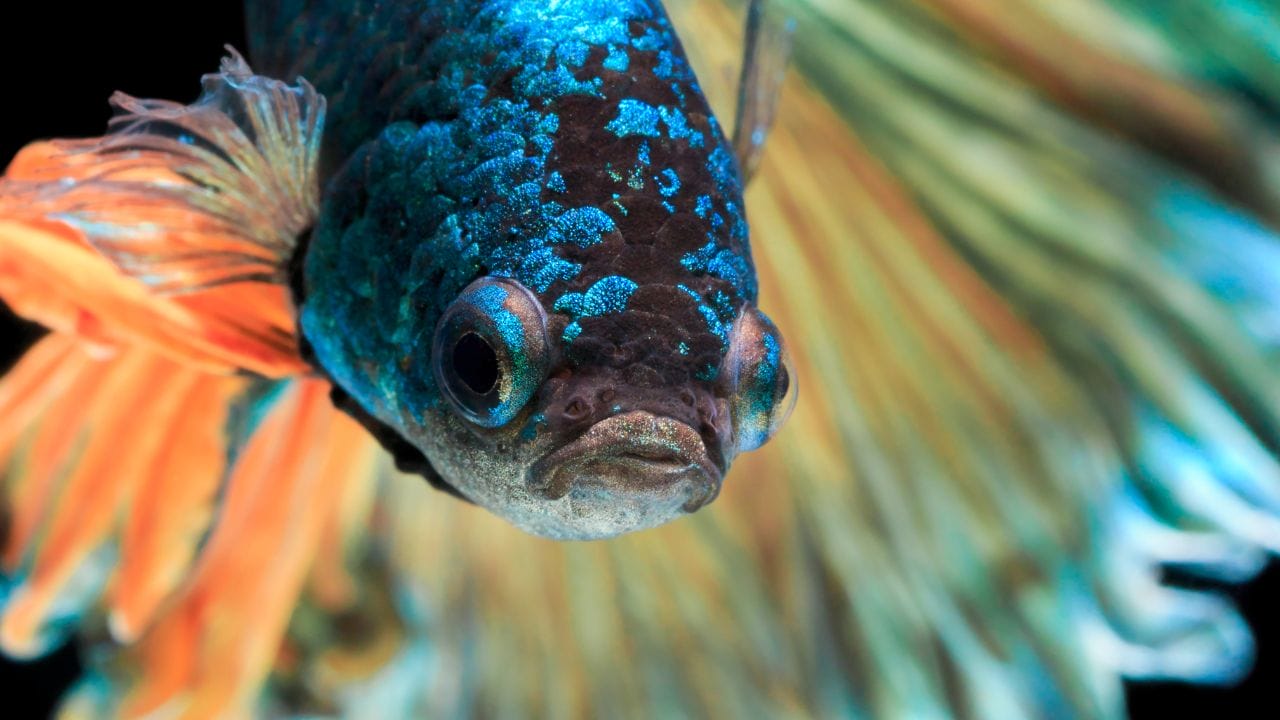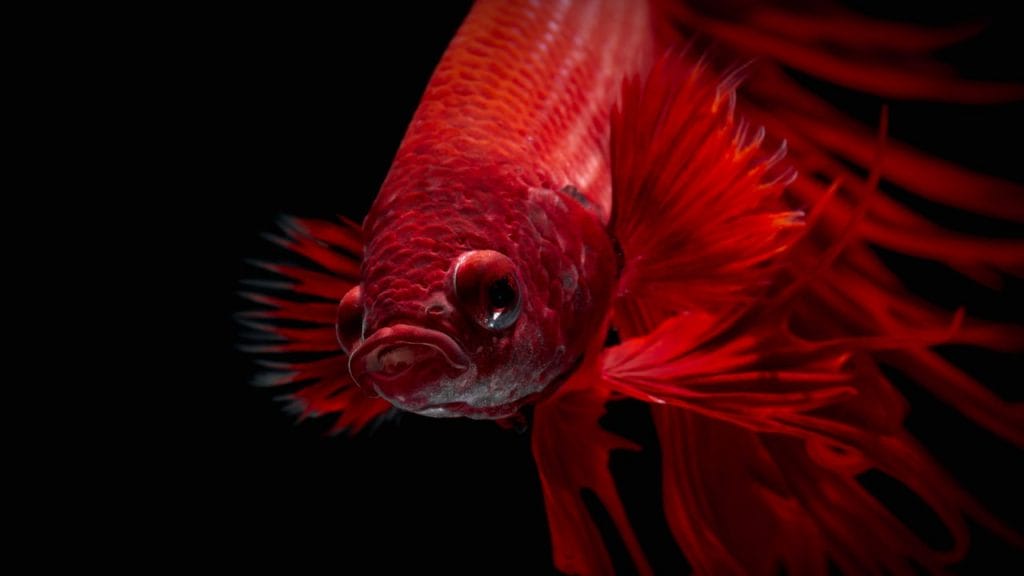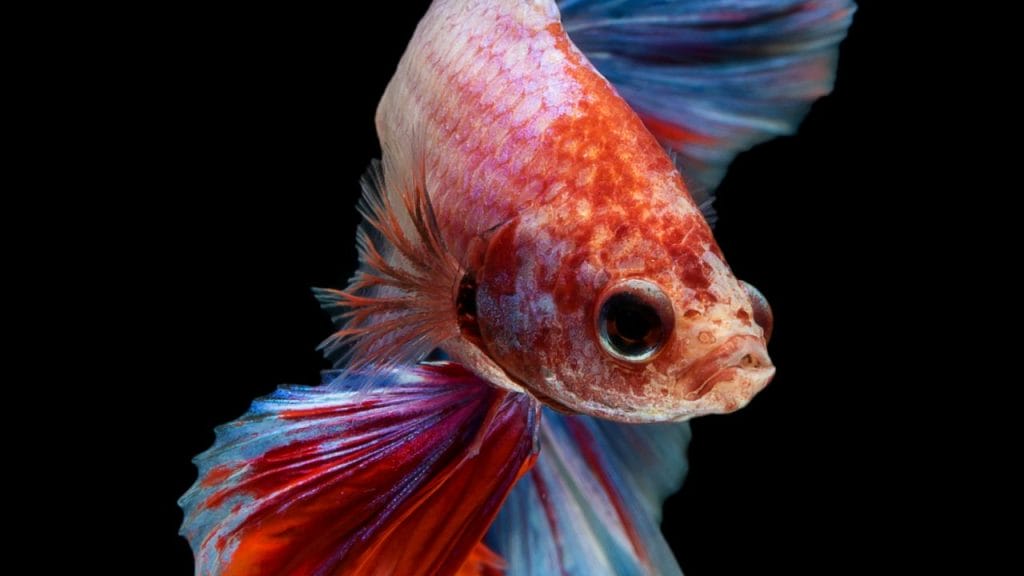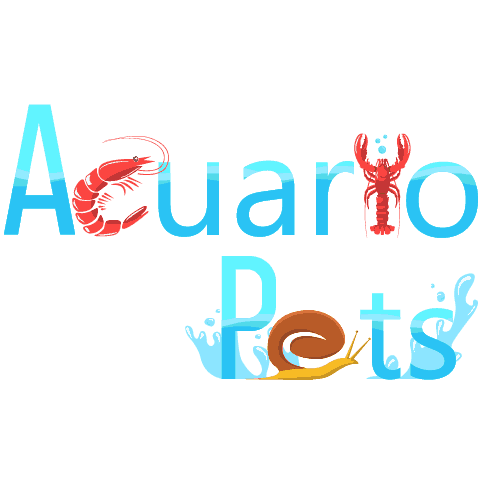Do Betta Fish Have Teeth? Can They Bite?

From the naked eye, bettas’ mouth looks like just two lips and that’s all. But you may wonder whether your bettas have anything hidden behind those lips. Perhaps, a set of teeth?
Bettas have teeth at the bottom layer of the jaws. It can be hard to see, but betta has a row of white, tiny teeth. And you can’t scratch the possibility of being bitten by those tiny teeth.
If you are wondering about the functionality and potency of betta’s teeth, this article is the place to look at. Let’s explore together and know everything there is to know about betta’s teeth.
Description of Betta’s Teeth
Betta may deceive you with their cute, vibrant outlook, but they are originally very aggressive and territorial. Betta’s upturned mouth helps them to catch their prey. And their teeth, inside those mouths, have the capability of ripping the tails of other inhabitants. Those are white, tiny, leveled, and pointy.
Their teeth are microscopic in nature and sharp as an arrow. You probably need a magnifying glass to see their teeth. Their upturned mouth and piercing teeth work together to ensure the prey doesn’t flee. Also, they use them to chew food. When you compare the strength of the similar-sized betta and white shark’s teeth, the betta teeth will definitely win.
Functionality of Betta’s Teeth
You may wonder what the purpose of betta’s teeth is and what they do with them. Well, even though the teeth’s size is minimal, their functionality is monumental and crucial for the bettas to lead a healthy and happy life. Let’s see what they do with their tiny teeth_
1. Chew food
Bettas are omnivores and a big portion of their diet consists of meat such as live foods, bloodworms, frozen insects, pellet foods, etc. For viable digestion and good metabolism, the chunks of food should be chewed into smaller pieces. They also snack on leaves and algae in the tank. Teeth help them to tear them apart.
Fiber is an essential ingredient of a betta’s diet because that keeps them away from constipation. And live foods are a good source of that. That is why, it is recommended to provide bettas live foods, like bloodworm and brine shrimps. And to destabilize those live foods, they use their teeth.
As mentioned earlier, betta’s diet has lots of animal protein sources. Alive or frozen, those sources are hard to swallow for the little bettas. crustaceans, snails, cherry shrimp, brine shrimp, insects, and arachnids require to be chewed. That is why after catching their food, bettas spit the food out in the water and nibble it down with their teeth.
2. Attack and defense
In their original home, people call them Siamese Fighting Fish and, not without a reason. They are not very fond of the idea of other members of the same species and genus invading their space. There is a survival of the fittest game among them.
They tend to dilapidate their opponent’s beautiful fins to manifest their strength. The ones who are proven weak don’t get any female bettas to spawn. So, protecting themselves and attacking others is in their nature. And what helps them to rip off those fins? Yes, the teeth.
3. Ambush
Bettas don’t rely on the food that has been provided for them. They are attracted to the larvae or eggs that have been laid on the water by bugs. Mosquitos, midgets, and bloodworm lay their eggs on water and those are a good source of protein for the betta’s diet. To snatch and gnaw these foods, bettas use their spiky teeth.
4. Protects the eggs
This may not seem like a job for teeth, but they play a crucial role to safeguard the eggs. Females usually lay eggs on the bottom of the tank. To protect the eggs, the males keep the eggs in between the teeth. Even though those gaps are less than millimeters apart, they are proven a safe house for the eggs.
They keep the eggs in a secure environment and move them to a safe location on the surface. Not only that. The male betta will create a bubble nest and safely deliver the eggs inside the bubble. The eggs stay in that bubble to be lodged and fertilized and move toward the development stage.

Do The Betta Fishes Bite?
Some bettas use the full potential of their row of white, spiky teeth and are fully capable to bite you. This actually depends on the nature and temperament of them. While some bettas are peace-loving, calm, and gentle by born, some are aggressive and succumbs to their primal instincts easily.
The reality is the bettas are more in danger than your finger if they bite you. Their teeth can’t cause severe damage to your skin, but they may alter or break their jaws if the biting is too hard. So, for the sake of your betta’s safety, you should refrain from putting your hands inside the tank.
But not always the biting occurs due to malintent or ill-will. Sometimes even the laid-back, chill dude can accidentally bite you. So, it is better to know the causes to avoid these gnawing.
Why Does the Betta Bite?
The chances of getting bitten by a betta are slim but not unheard of. So, you should know why the betta might attack your fingers if you insert your hand in the tank.
1. Mistaken as Food:
Bettas are not very picky about their food. Whatever comes inside the tank, they run for a taste of it. If you toss anything inside the tank, they will hurry up to gulp it inside. Your finger inside the tank causes the same reaction. So, it is better to use aqua-scaping tools so that your fingers are safe, and the residue of oil, chemicals, and soaps doesn’t pollute the water.
2. Curiosity:
Well, who wouldn’t be curious if a gigantic finger suddenly appears and penetrates the water? The bettas sure are curious. Maybe they want to check the new object out. Or maybe it is their way of welcoming your finger. Who knows?
3. Stress:
An unidentified object suddenly invading can’t be good news. If we humans believe that your betta may believe that too. Bettas can initiate their attacking mode due to stress caused by your unidentified fingers. And their self-defense pretty much relies on their teeth’ actions.
Do Betta Fish Bites Hurt?
Bettas are known for their piercing, tiny teeth but those are not strong enough to pierce through human skin. It will just give you a ticklish sensation, or like a fish brushing against you. If you have any food on your hand, it will chomp on them till those are finished.
On the flip side, betta bites will cause lots of pain for other fish and inhabitants. Their teeth may not penetrate your skin, they are really sharp if you compare other fish’s teeth. And, due to their aggressive nature, you can’t brush off the possibility that they will not bite other inhabitants.

Do Female Bettas Have Teeth?
Both male and female bettas have tiny, spikey teeth between them. The only difference between male and female betta is that male bettas’ fins are colorful, vibrant, and longer. And female bettas are genuinely calm and shy in nature. So, they hardly use their teeth for biting or attacking. The main purpose is to chew food.
Do Betta Fish Bite During Spawning?
If you have both male and female bettas, eventually they will mate, and it will procure the spawning season. The spawning season brings different attributes to different animals. Bettas become more aggressive and territorial during the spawning period, more than usual. And both male and female bettas manifest their aggression through biting.
And more intriguing part is bettas bite during spawning can be seen between male and female bettas. But not always this biting brings an ominous vibe. Bettas biting the opposite gender can lead to a good cause or a bad cause as well.
When Biting Is Beneficial
When a betta bites another betta and the second betta moves away a little or stays as it is, it means that the bitten betta is not against mating with the previous betta. And it indicates that it is not yet ready to mate but doesn’t oppose the idea of mating with the biting betta.
Biting with such intentions is not that strong. It is an easy gesture to drag the other’s attention. Of course, there are other ways to invite mating, but bettas use this quite much. This doesn’t cause much hurt to the bitten betta but he or she understands the proposal well.
When Biting Is Harmful
Ironically, bettas use biting to indicate their disregard for mating with the opposite betta. This type of biting is aggressive and can put the bitten fish in danger. Both males and females can be the perpetrator and victims of such attacks.
These biting attacks happen mostly around the fin or tail area. The aggressive biter attempts to destroy the opposite’s fins and the fighting is reciprocated. If you notice the bitten bettas look scary and can’t fight back that strongly, try to separate them as early as possible.
Can Betta’s Teeth Fall Out?
Losing teeth is not a very common attribute of betta. If you see your betta has lost one or more teeth, it can be a symptom of something grave. The most common ground of losing teeth is encountering injury. As mentioned earlier, bettas are aggressive and belligerent in nature, and their teeth are the only weapon they got. It is not unplausible for them to lose a tooth during a fight.
Another reason can be Columnaris disease which is a fungal infection that can be contracted through other species or by consuming algae. The mouth swells up and may cause detaching, which eventually causes the teeth to fall. Moreover, old age can also be a reason behind for bettas to lose teeth. Even though it is not a matter of a big headache, give your bettas softer food and let them recover.
Final Words
Both male and female bettas have teeth on their lower jaw, which can be tiny but also spiky. Their main purpose is to chew and masticate the food and work as a weapon for attacking and defending. They have a tendency to bite but your finger is safe from them.
About Author
Hello, I’m Muntaseer Rahman, the owner of AcuarioPets.com. I’m passionate about aquarium pets like shrimps, snails, crabs, and crayfish. I’ve created this website to share my expertise and help you provide better care for these amazing pets.
Disclaimer
This site is owned and operated by Muntaseer Rahman. AcuarioPets.com is a participant in the Amazon Services LLC Associates Program, an affiliate advertising program designed to provide a means for sites to earn advertising fees by advertising and linking to Amazon.com. This site also participates in other affiliate programs and is compensated for referring traffic and business to these companies.

